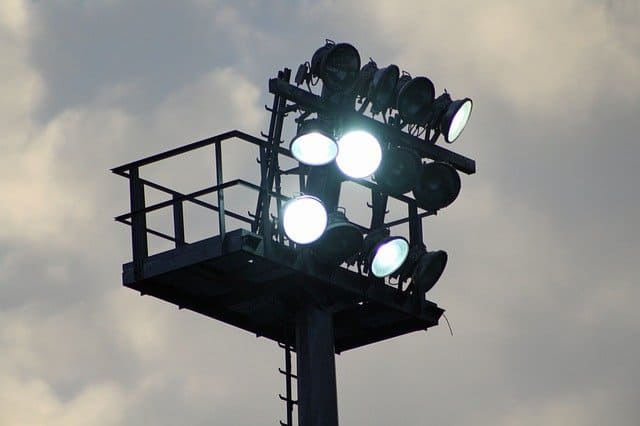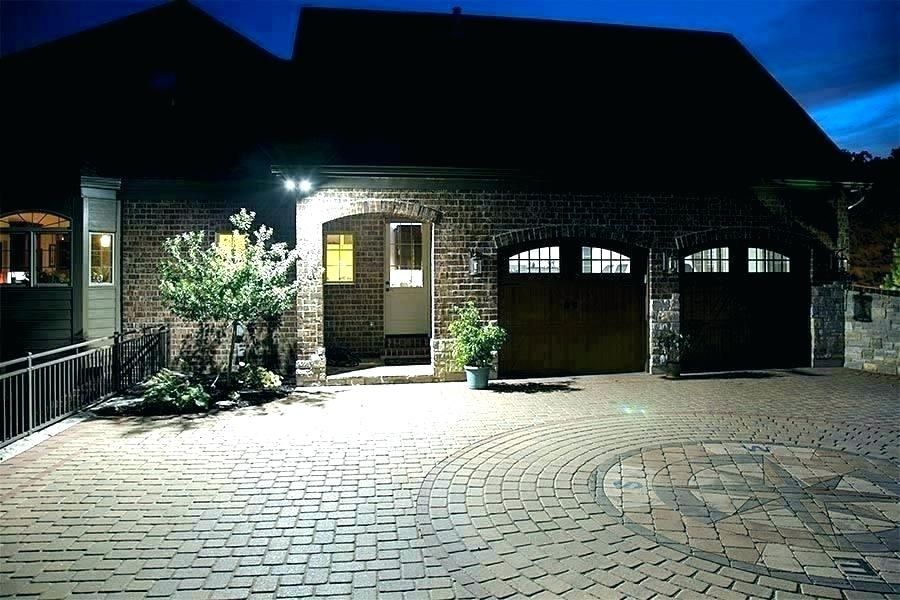You might be wondering whether you can use your indoor flood lights outside. There are several points that you should pay attention to. In this article, we will give you some tips on using your indoor flood lights outdoor.
What is the difference between indoor and outdoor flood lights?
The main difference between indoor and outdoor flood lights is their IP rating. The IP rating of a light fixture indicates its level of protection against dust and water. Indoor flood lights have an IP rating of 20-44, while outdoor flood lights have an IP rating of 54-65. This means that outdoor flood lights are better protected against the elements and can withstand more wear and tear.
Floodlights may be used for both indoor and outdoor events. The major difference between the two is that outdoor bulbs are better suited to weather conditions such as rain, snow, and heat. The construction of outdoor flood lights is also more durable, so they can withstand being dropped or stepped on.
Can you use the indoor flood light outside?
In general, you should avoid using indoor LED lights outside. The danger of electric fires is just too high. Use interior bulbs with thick glass, however, if you must use them. LEDs are the most suitable type of bulb for outdoor usage. You should also get a waterproof power supply.
If you're using an indoor bulb outdoors, make sure that the glass is thick. You might want to consider using an LED light instead. These are much safer and more durable. Pay attention to getting a waterproof power source as well.
In conclusion, it is not recommended to use indoor flood lights outdoor due to the danger of electric fires. If you must use them, make sure to use thick glass bulbs and a waterproof power supply. LEDs are the best type of bulb for outdoor usage.
What happens if I use indoor lights outside?
You should not put an indoor light fixture outside in a wet location. They aren't water-tight, so they won't function in the first big rain. Furthermore, because the components that cover the electrical connections are prone to deterioration, they aren't corrosion-resistant and might be an electrocution risk if you use them outdoors in wet places.
So, while you might be able to get away with using an indoor light outside for a little while, it's not advisable in the long run. It's better to buy an outdoor light fixture that's specifically designed to withstand the elements.
Can all LED lights be used outdoors?
LED lights may be used in an outdoor setting as long as they are properly installed and have the appropriate sealing. LEDs come with varying ratings, called Ingress Protection, or IP ratings, which must be considered. The IP rating will tell you how well the light is sealed and protected against things like water, dust, ice, and other foreign objects.
For example, an LED with an IP54 rating means that it's protected against dust and water. However, it's not completely sealed and may still be damaged by heavy rains or snow. An LED with an IP65 rating is completely sealed and can withstand heavy rains and snow.
When choosing an outdoor LED light, make sure to check the IP rating to ensure that it can withstand the weather conditions in your area.

How do you know if lights can be used outside?
The US Fire Administration advises that only lights certified by an approved testing facility should be used, so check the box before purchasing. If you're using old holiday lights from the basement, look for a tag near the socket to determine whether they're outdoor or indoor lights. New lights will have a green tag if they're for outdoor use.
Lights that are certified for outdoor use have thicker insulation on the wires and sockets to prevent electrical fires. They also have stronger construction to withstand being stepped on or dropped. When in doubt, it's always better to buy new lights that are specifically designed for outdoor use.
Are all LED lights waterproof?
Most LED lights are not waterproof. However, there are some that are specifically designed for outdoor use and are waterproof. When choosing an outdoor LED light, make sure to check the IP rating to ensure that it can withstand the weather conditions in your area.
The LEDs are waterproof with an IP65 rating and can be used in an outdoor environment, but they aren't waterproof and shouldn't be immersed. An IP68 can be submerged in water.
How do I know if my LED lights are waterproof?
When purchasing an LED strip light, the level of waterproofing is usually shown on the product information page. Overall, it's classified as non-waterproof, waterproof against drops and splashes, and fully waterproof.
The IP65 waterproof LED strips are suitable for use in an outdoor setting as long as they are properly installed and have the appropriate sealing. LEDs come with varying ratings, called Ingress Protection, or IP ratings, which must be considered. The IP rating will tell you how well the light is sealed and protected against things like water, dust, ice, and other foreign objects.
For example, an LED with an IP54 rating means that it's protected against dust and water. However, it's not completely sealed and may still be damaged by heavy rains or snow. An LED with an IP65 rating is completely sealed and can withstand heavy rains and snow. When choosing an outdoor LED light, make sure to check the IP rating to ensure that it can withstand the weather conditions in your area.
How do you make flood lights waterproof?
You can make your own flood lights waterproof by using a water-resistant sealant on the wires and connections. Make sure to use a sealant that is designed for electrical use. To do so you have to:
- Unscrew the light housing and remove the lens
- Apply a generous amount of sealant to the wires and connections
- Replace the lens and screw the housing back on
- Let the sealant dry for 24 hours before using the light
What are some tips for using outdoor lights?
- Check the IP rating to make sure the light can withstand the weather conditions in your area.
- Make sure the light is certified by an approved testing facility.
- Look for a tag near the socket to determine whether the light is for indoor or outdoor use.
- Only use thick, heavy-duty extension cords outdoors.
- Never overload outlets or extension cords.
- Never leave lights on unattended.
- Always turn off lights before going to bed or leaving the house.
With these tips in mind, you can safely enjoy using outdoor lights without worry. Just be sure to take the necessary precautions and use only lights that are designed for outdoor use.
Why are some lights outdoor only?
The most obvious distinction between indoor and outdoor lighting is that outdoor lights are often composed of non-corrosive materials to withstand all of the elements they may encounter. They're also more waterproof because of the potential water they will come into touch with, whether it be rain or snow.
Furthermore, outdoor lightbulbs are more likely to be shatterproof due to the potential for high winds and debris. And lastly, many outdoor lights come with dusk-to-dawn sensors that automatically turn the lights on at sunset and off at sunrise, which is a convenient feature if you don't want to remember to do it yourself.
So while you could technically use an indoor light outside, we wouldn't recommend it because it probably won't last as long and may not withstand the elements as well. Plus, there are so many great outdoor lights available that are specifically designed for outdoor use - why not just get one of those? They'll save you time and money in the long run!

What about LED strip lights?
If you want to use LED strip lights outdoors, make sure to choose a waterproof option. You can find these by looking for an IP65 rating (or higher). These lights are designed to withstand the elements and will last much longer than non-waterproof options.
Remember to also use a sealant on the wires and connections to make sure they're completely waterproof. And be sure to let the sealant dry for 24 hours before using the light.
With these tips in mind, you can safely enjoy using outdoor LED strip lights without worry. Just be sure to take the necessary precautions and use only lights that are designed for outdoor use.
Should I leave outdoor lights on all night?
Should you leave outside lights on at night? No, keeping lights on might lead intruders to believe that you aren't at home. Use a motion sensor light that activates when anyone approaches so you only have illumination when you need it.
Moreover, from the economic point of view, unnecessary usage of light also leads to an increase in your electricity bill. It is important to remember that even if you are not at home, your outdoor lights are still using energy and costing you money. If you want to be eco-friendly and save on your electric bill, it's best to only use your outdoor lights when necessary.
Still, if you are a person who feels safer with your outdoor lights on at night, then by all means, keep them lit up! Just be sure to use energy-efficient bulbs so you aren't wasting electricity.
So there you have it - while you could technically use indoor flood lights outside, we don't recommend it because they aren't made to withstand the elements and may not last as long. Plus, there are so many great outdoor lights available that are specifically designed for outdoor use - why not just get one of those? They'll save you time and money in the long run!
What are some other tips for indoor lights outside?
There are several additional things to keep in mind when using indoor lights outside:
- Be sure to choose a waterproof option if you're using LED strip lights. You can find these by looking for an IP65 rating (or higher). These lights are designed to withstand the elements and will last much longer than non-waterproof options.
- Remember to also use a sealant on the wires and connections to make sure they're completely waterproof. And be sure to let the sealant dry for 24 hours before using the light.
- Use energy-efficient bulbs to save on your electric bill.
- Consider using motion sensor lights so you only have illumination when you need it.
- Turn off your outdoor lights when you don't need them to save energy.
Final words
So, if you want to use indoor flood lights outside, be sure to choose a waterproof option and use a sealant on the wires and connections. Use energy-efficient bulbs to save on your electric bill, and consider using motion sensor lights so you only have illumination when you need it.
Turn off your outdoor lights when you don't need them to save energy. And remember - there are so many great outdoor lights available that are specifically designed for outdoor use - why not just get one of those? They'll save you time and money in the long run!